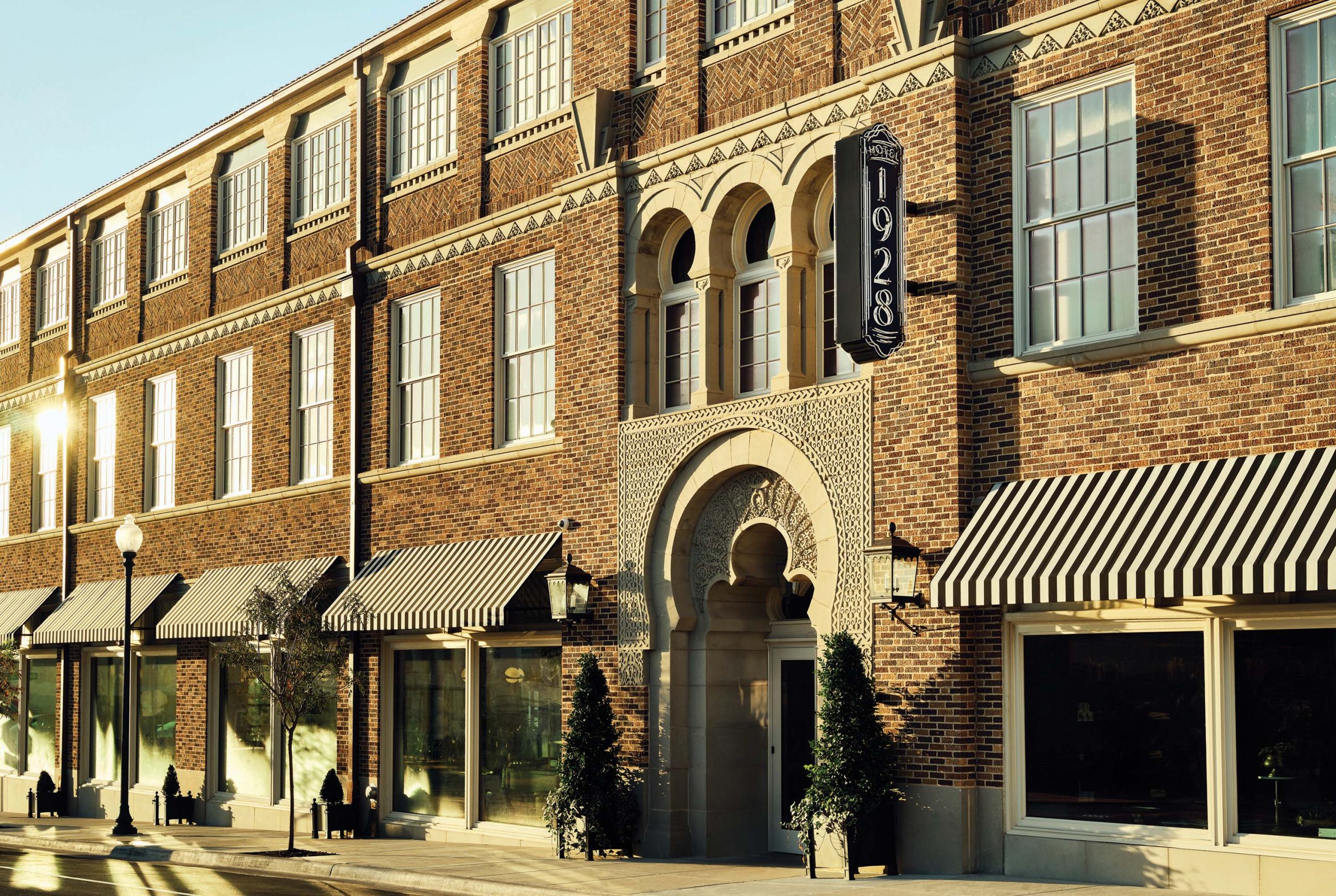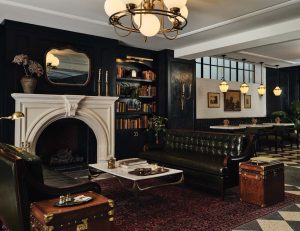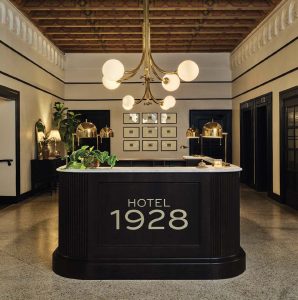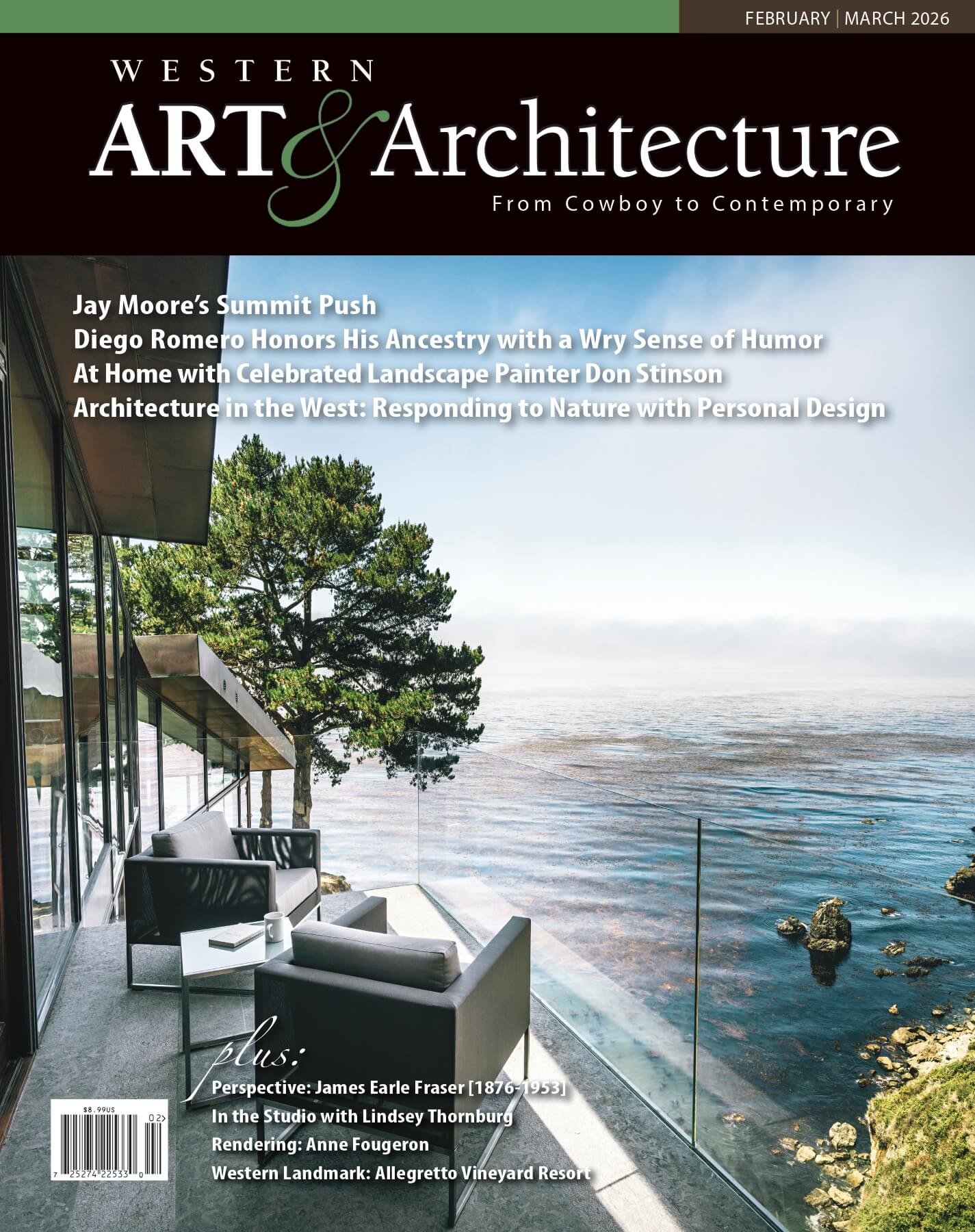
03 Jan WESTERN LANDMARK: FROM DUSTY TO DESTINATION
Washington Avenue, home to the newly revitalized Hotel 1928, has long been a thoroughfare in the Central Texas town of Waco. Its bridge spans the Brazos River and connects East Waco to downtown. Since this city’s founding in 1849, people have come to Washington Avenue to gather, converse, and celebrate. Today, the revitalization of Hotel 1928 is a continuation of this rich history.

The two-story Library is filled with nearly 8,000 historic books from Larry McMurtry’s bookshop, Booked Up, in Archer City, Texas. Many titles are from the 1920s and ’30s. Photo courtesy of Hotel 1928
With a storied past and an intentionally designed present, the hotel is poised to carry Waco into the future. Chip and Joanna Gaines, local Wacoans who gained national fame on their home renovation show “Fixer Upper,” led the redesign. With a national magazine, Magnolia Journal, and design partnerships at consumer meccas like Target, their cultural influence is palpable. After turning some deserted grain silos in Waco into shops and restaurants that have brought crowds and acclaim, their vision for their hometown extended to the hotel. In 2020, they began transforming a building that had been gathering dust for too long into a destination for travelers who want more story, design, and depth to their stays.

The lobby embraces the Art Deco aesthetic of the 1920s. Photo courtesy of Hotel 1928
The hotel’s original building, the Grand Karem Shrine, was designed by Herbert M. Greene and Roy Ellsworth Lane in the style of a Moorish Revival lodge and was dedicated in November 1928. Greene had a history of working on Masonic Lodges and he also designed a significant number of buildings for the University of Texas at Austin. Lane was a local architectural celebrity, contributing to the ALICO building — still Waco’s most recognizable structure — and Cottonland Castle, the much-loved manor that anchors one of the city’s oldest neighborhoods, Castle Heights.

With an elevated cocktail lounge vibe, Bertie’s on the Rooftop offers a full menu and views of downtown Waco, the Brazos River, and Baylor University. Photo courtesy of Hotel 1928
The Grand Karem Shrine building offered distinct design features for the new hotel. Because of its status as a historical landmark, much of the original building remained the same after the renovation. The external silhouette retained the square rooftop penthouse. Look closely, and you’ll find elements like double eagles and scimitars used by the Freemasons and Shriners. Because it was a gathering place, the internal layout incorporates a grand ballroom or assembly room. Welcoming entryways allowed people to flow in and out and have been updated with brass lights and soothing paint tones. The stonework, exposed beams, terrazzo, and some of the concrete floors remain from the original building.

The Brasserie at Hotel 1928, located to the left of the lobby, features “Southern classics with a Texas twist.” Photo courtesy of Hotel 1928
When it came to the design, creative solutions were developed to keep aspects of the building intact while transforming it into a hotel with 33 guest rooms, including four suites. Each suite is named after an avenue in Waco — Columbus, Franklin, Austin, and the flagship suite Washington, which sleeps up to 12 adults with common living and dining areas. Exploring the hotel is like standing in that liminal space between old and new, letting the best of what was before transition into comfortable, contemporary design.
One of only a handful of spots in town offering rooftop entertainment, Hotel 1928’s restaurant and bar, Bertie’s on the Rooftop, offers views of downtown that reach Baylor University. There are two other restaurants in the hotel: the full-service Brasserie at 1928 and the Café, which is tucked behind the lobby and check-in desk.
With coffee and a croissant from the Café in hand, one is poised to visit The Library, a two-story room filled with historic books. Originally a coal cellar, The Library was reimagined with a spiral staircase descending into a cozy, thick-rugged, book-lined space. Like much of this renovation, the books have their own story. Larry McMurtry, perhaps one of the most famous Texas authors, was a long-time owner of a bookstore in Archer City, Texas. When the bookstore closed, Chip Gaines purchased the bulk of the inventory for this library space. Today, when guests settle into the room, they are surrounded by books selected not just for aesthetics but also for their history.

The 33 guest rooms were designed to reflect the grandeur of the 1920s while providing a comfortable resting place. Photo courtesy of Hotel 1928
With its position in the state, about 90 miles from Austin, Dallas, and Fort Worth, respectively, Waco will never be one of the Texas heavy hitters. Its location gives it a unique advantage, though. In reach of more countrified, pastoral living, with trappings like Hotel 1928 infusing sophistication and elegance, the town embodies the realities of today’s Texas. Rural and urban. Yesterday and today. Glamour and comfort. Relaxation and the throwback to its birth year of 1928 — a roaring good time.
Anna Mitchael has spent more than 20 years as a writer and editor based in Texas. Her newest book, They Will Tell You the World is Yours: On Little Rebellions and Finding Your Way, is coming May 20, 2025; annamitchael.com.






No Comments